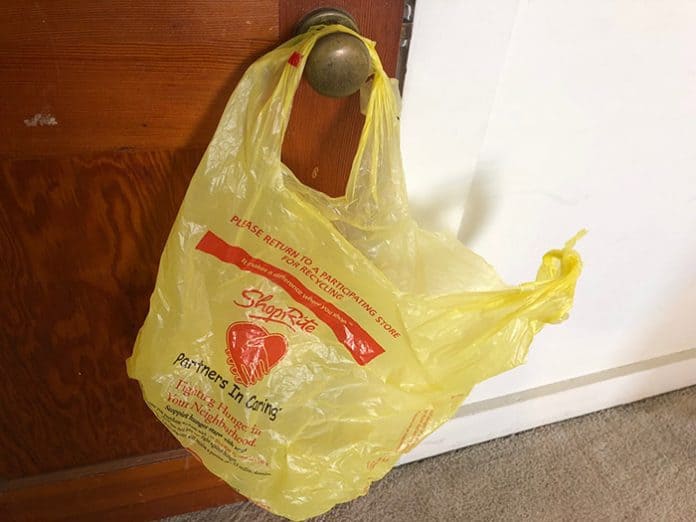
MANCHESTER – The councilman loves the environment and wants it protected. But the state using environmental concerns as another way to tax residents, not so much.
“The bill started out as, ‘We want to ban plastic bags,’” Councilman Craig Wallis said. The bill went through the typical revision process, “and then they decided, ‘Well, now we need to charge for paper bags. …They also added in they want to build a committee to monitor plastics. To me, we pay more people to do this. They took a good thing they started with, trying to help clean up the environment a little bit, and then they started making it about money.”
The Manchester Council did pass a resolution supporting Bill S2776, which would prohibit the use of plastic bags, Styrofoam, and single-use plastic straws. The original language of the bill, introduced June 25, called for a $5,000 fine per offense for violators.
However, the bill went through a revision in the Senate Environment and Energy Committee on Sept. 27. Businesses that violate the ban would be subject to increasingly stiff penalties: $500 for the first offense, $1,000 for the second, and $5,000 for the third and beyond.
The Committee also called for a 10-cent-per-paper-bag fee, with 5 cents going to the state, and part of that paying for a “Plastic Pollution Prevention Fund.” Businesses would keep the other half.
An identical bill was introduced in the Assembly (A4330) July 30 and referred to its Environment and Solid Waste Committee.
Council President Joan Brush, Council Vice President Samuel Fusaro and Councilman Charles Frattini supported the resolution, which “urges Governor Murphy and the New Jersey Legislature to act quickly to protect all New Jersey residents by passing the statewide legislation banning the use of plastic bags and promoting the use of reusable bags.”
Councilman James Vaccaro joined Wallis in voting no.
According to the National Conference of State Legislatures, California became the first state to ban single-use plastic bags and impose a minimum 10-cent fee per recycled paper bag in 2014. Hawaii has what the group calls a de facto ban on nonbiodegradable plastic bags. New York’s statewide ban will take effect March 2020, but exempts “bags distributed at the meat/deli counter and bulk food area are exempt, as well as newspaper bags, trash bags, garment bags, bags provided by a pharmacy for prescription drugs, and restaurant takeout bags.
The law allows individual counties the option of placing a 5-cent fee on paper bags, with 2 cents going to local governments and 3 cents to the state’s Environmental Protection Fund.
“One of the main reasons this is so important to us is because we are in the Barnegat Bay Watershed,” Manchester resident Peggy Middaugh said. She is business manager of EarthShare New Jersey based in Trenton, where according to the organization’s website its “members work within the community to educate the public and find solutions to our environmental issues and challenges.”
“This plastic bag, plastic straws, plastic overload, is particularly detrimental to wildlife and the environment. It has a really big impact on the economy of the coast. We are very close and we have a lot to benefit from the coast,” Middaugh said.
The issue made it into the pages of the New York Times, where writer Brad Plumer made the case that banning plastic and using paper isn’t a black-and-white, right-or-wrong issue. Most recycling centers can’t handle plastic bags – they clog the machinery. He argued that plastic bags don’t cause much harm sitting in a landfill, despite taking over 1,000 years to decompose (we assume, plastics haven’t been around that long to know), but cause problems when they become litter and make their way to environmentally sensitive areas.

It takes more energy to harvest trees and manufacture paper bags than it does to create plastic bags from oil, Plumer continued. “You’d have to reuse a paper bag at least three times before its environmental impact equaled that of a high-density polyethylene plastic bag used only once. And if plastic bags were reused repeatedly, they looked even better.”
Even reusable cotton bags consume many resources – land, water, fertilizer, pesticides – to make. A 2011 British Environmental Agency study found that a shopper would have to “reuse his or her cotton bag 131 times before it had a smaller global warming impact than a lightweight plastic bag used only once.”
The United Nations Environment Programme issued a 118-page report “Legal Limits on Single-Use Plastics and Microplastics: A Global Review of National Laws and Regulations.” They found 127 out of 192 countries surveyed have adopted some form of regulation on single-use plastic bags.
“Each year, more than 8 million tons of plastic ends up in the oceans, wreaking havoc on marine wildlife, fisheries and tourism, and costing at least $8 billion in damage to marine ecosystems. World production of plastic materials in 2016 was 280 million tons, of which about one third is single-use plastics,” the report said.
Most plastic pollution comes from Asia, specifically China, but the report said the United States “is the largest generator of plastic packaging waste on a per-capita basis, followed by Japan and the European Union.”
Back in New Jersey, there’s been no movement on the bill since late 2018. Some municipalities, such as Stafford Township, have taken it upon themselves to ban plastic bags. That ban went into effect Dec. 6.






